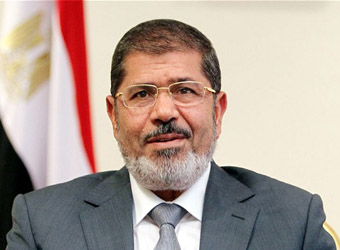As protesters battled supporters of Egyptian President Mohamed Morsi outside his palace, his chief of staff announced Thursday that the president would address the nation later in the day.
The chief of staff, Refaa El-Tahtawy, said the speech would include important news but did not specify what that might be.
The announcement came hours after demonstrations erupted into violence Wednesday night over Morsi’s assumption of sweeping powers last month.
Three of Morsi’s advisers resigned Wednesday in protest of his edict, while demonstrators set fire to offices of the Muslim Brotherhood and its political arm, the Freedom and Justice Party, in three cities.
The unrest comes as Egypt lurches toward a scheduled December 15 referendum on a new constitution. Days of largely peaceful protests in Tahrir Square had preceded Wednesday’s violence.
But that all changed Wednesday. After Morsi supporters chased protesters from the grounds, pro- and anti-Morsi demonstrators threw rocks, fireworks and Molotov cocktails at each other.
Late in the day, a spokesman for the Muslim Brotherhood called on protesters to withdraw from the area of the palace “and not to protest there again due to its significant symbolic position as the president’s office.”
The Health Ministry reported four were killed and 271 were injured; state media reported earlier in the night that no one was killed.
Dr. Mohamed Sultan, a spokesman for the ministry, said the injuries ranged from bruises to cuts, burns and fractures.
More marches were promised for Thursday, said Rami Shath, a member of the Revolutionary Alliance and the Free Egyptian Party.
“We hold opposition figures, namely Sabbahi & ElBaradei, fully responsible for escalation of violence & inciting their supporters,” said the Muslim Brotherhood in a tweet, referring to opposition leaders Hamdeen Sabbahi and Mohamed ElBaradei.
Morsi, Egypt’s first freely elected leader, was a Muslim Brotherhood leader before winning office in June, when he resigned from the movement and the Freedom and Justice Party to represent all Egyptians, he said. Demonstrators were protesting his recent edict granting himself sweeping powers and the proposed constitution — drafted by an Islamist-dominated council — that they fear will give him even more power.
“This is not what we asked for,” one protester said. “It’s a complete dictatorship.”
Other protesters vowed to remain in the streets until Morsi is forced to leave office. “He’s not our president anymore,” another protester said.
The three advisers who announced their resignations said they had done so after failing to persuade Morsi to reverse his November 23 decree.
“He has rejected all our suggestions and initiatives that may have avoided the cycle of violence we are witnessing today,” Ayman al-Sayad, Seif Abdel Fattah, and Mohammed Esmat said in a joint statement.
But the powerful Muslim Brotherhood called the protesters “thugs” who were trying to overthrow the president.
“By the grace of God, the Egyptian people will be able to protect this legitimacy, its constitution and its institutions,” the group said on its Facebook page.
Ahmed Sobea, a spokesman of the Freedom and Justice Party, said the party’s offices in the northeastern cities of Suez and Ismailia had been ransacked and torched by masked, armed men on Wednesday night. The offices were empty when the attacks occurred, Sobea said.
State-run Nile TV broadcast pictures of the Ismaila office on fire and reported that other masked men had burned the Muslim Brotherhood headquarters in the northeastern city of Zagazig.
Opposition leaders are prepared to open talks with Morsi if he withdraws his edict and delays the referendum, said ElBaradei, leader of the liberal Constitution Party and a Nobel Peace Prize laureate. But Vice President Mahmoud Mekki said the referendum will be held as planned.
“Saying the referendum will be held on time is not being stubborn,” Mekki said. “The president has backtracked from decisions before; he’s not a stubborn character.”
Morsi’s decree placed his decisions out of the reach of courts until a new constitution is approved. He said the move was designed to protect the spirit of the popular 2011 uprising that drove former strongman Hosni Mubarak from power.
Critics call it a power grab.
Egyptian judges and media outlets as well as liberal political groups have protested Morsi’s decree and the proposed constitution, saying it goes against the goals of the revolution.
How the struggle plays out could have repercussions across the Middle East and North Africa, regions already wracked by upheaval. In nearby Gaza and Israel, tensions remain high after last month’s fighting. In Syria, a civil war has raged since March 2011.
Wednesday’s violence followed clashes Tuesday outside the palace, which has become the focus of protests by Egypt’s liberal opposition.
On Tuesday night, police fired tear gas after anti-Morsi protesters broke through barbed wire around the palace and hurled chairs and rocks at retreating officers. After the initial clashes, police withdrew behind fences and the demonstration was peaceful for several hours.
Yassir Ali, a spokesman for the presidential office and the vice president, told reporters Wednesday that the presidential office had ordered the security forces at the palace “to protect the protesters and keep them safe.”
“The orders to the security forces were not to confront (them), (but) to preserve the lives of the protesters and to prevent any clashes between the security forces and the protesters,” Ali said.
CNN
